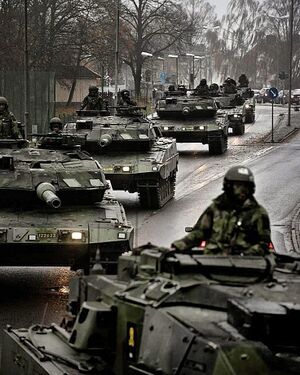Acrean Intervention in the Zemplen War
| Operation Stuðningur | |||||
|---|---|---|---|---|---|
| Part of the Zemplen War | |||||
 A column of Acrean armoured vehicles in Mátészalka, November 2009 | |||||
| |||||
| Belligerents | |||||
|
|
| ||||
| Units involved | |||||
|
Acrean Armed Forces Imperial Armed Forces of Ruvelka | Syaran Commonality Armed Forces | ||||
| Strength | |||||
| Various | Various | ||||
Acrean Intervention in the Zemplen War, code named Operation Stuðningur, was initiated by Acrean Chancellor Hans-Christian Sørensen on 3 August 2008 at the request of Ruvelkan Chancellor Edviná Molnár in response to the Syaran invasion of Ruvelka during the Zemplen War. The operation consisted of two main components; the deployment of Acrean expeditionary combat forces to Ruvelka and the establishment of sustained logistics support to Ruvelka. All forces deployed were organised under Acrean Forces in Ruvelka (ACRFR), a theatre command led by Supreme Commander General Jürgen von Edel, supported by RAMC General Ludwig Skarsgård and Army Generals Eirik Stordalen and Frederik Rasmussen. An air combat command controlling elements of the Royal Acrean Air Force who were deployed to the theatre to support Ruvelkan capabilities in the air was placed under the command of RAAF General Michel Volland. ACRFR's wartime order of battle consisted of 16 Army divisions and 4 Marine divisions for 20 total combat divisions. RAAF strength in Ruvelka varied during the conflict, reaching a peak of 764 aircraft deployed by September 2009.
Background
Acrean foreign policy towards Syara in the early 21st century was heavily reflective of its security concerns in the region and the consequences of its intervention in the Refusal War. As Rena had feared, the Warden victory led to heightened tensions between Syara and Ruvelka, and at the time formal security ties between Ruvelka and Acrea were limited only to security cooperation. Although some Acrean policymakers sought to accordingly establish security guarantees for Ruvelka, an increasingly belligerent Æþurheim and relatively good relations between Syara and Acrea drew Acrean attention away from the region throughout the 1990s. Likewise, the prevalent view in Rena at the time was that any formal Acrean security guarantees for Ruvelka would only cause a deterioration in relation between the two Siduri states due to lingering resentment towards Acrea in Syara.
Acrean policymakers largely ignored the security situation in Zemplen until the eve of the war in 2008, but the outbreak of the Imerti Conflict brought discussions about Acrea's security policy in northwestern Siduri back to the forefront of foreign policy considerations. Domestic political opinion in Acrea was split; a sizeable part of the government wished to pursue greater formal security ties to Ruvelka in light of the worsened relations between it and Syara, but this was complicated by the timeline of events which led to the opposite perspective amongst a majority of Acrean officials that Ruvelka bore the responsibility in starting the brief conflict. This sentiment effectively killed any proposals in the Riksdag for a formal mutual security pact with Ruvelka under the administration of Dominik Veres, as it was viewed that it created an undue risk for Acrea to be drawn into a war in northwestern Siduri that it did not wish to be. It continued to be a politically sensitive topic domestically until 2008, even as the Acrean Foreign Ministry and Ministry of Defence continued cooperation with their Ruvelkan counterparts. Political opinions shifted with developments in Zemplen and other border territories, and were likewise informed by opposition to diverting attention and resources away from western Eracura in light of aggressive Aethurian rhetoric.
Preparations for assistance to Ruvelka in anticipation of a potential conflcit began in early 2008 under executive authority of the Sørensen administration.